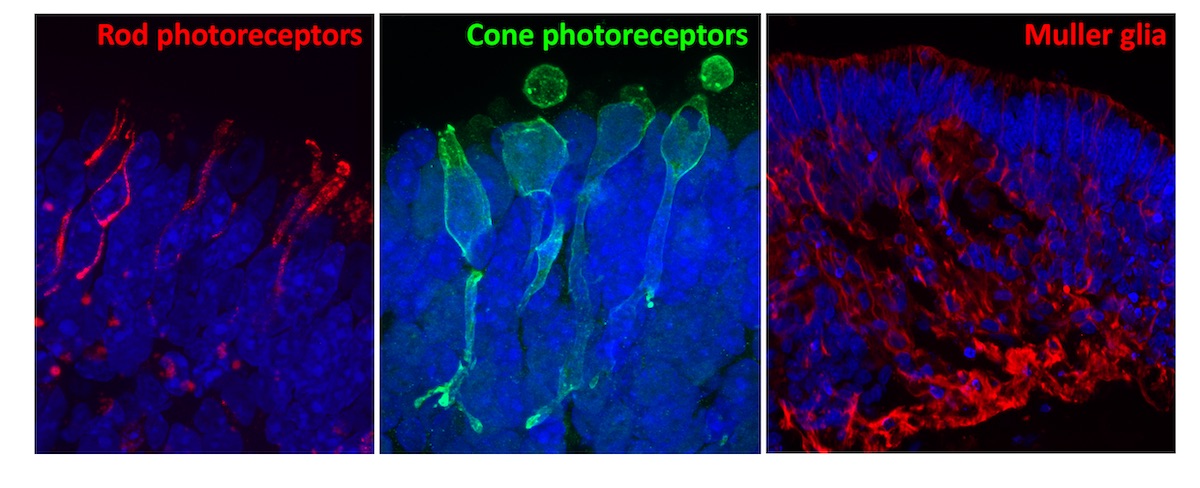Channels
Special Offers & Promotions
Low Adhesion Plates Facilitate Retinal Organoid Culture

Retinal organoids continuously grown on Lipidure®-coated plates from the start of differentiation. Immunofluorescence images of 150-day old organoids show rod and cone photoreceptors containing outer segments on the apical side and synaptic terminals at the base. Muller glial cells span across the entire thickness of retinal neuroepithelium.
Courtesy: Professor Majlinda Lako, Newcastle University and Dr. Valeria Chichagova, New Cells Biotech
AMSBIO reports on how several leading European research groups have used their Lipidure® coated microplates to help culture physiologically functional, light-responsive retinal organoids.
Development of in vitro models of the human retina in which to perform pharmacological and toxicological studies is an urgent area of vital research. An essential step for developing in vitro models of human retina is the ability to generate laminated, physiologically functional, and light responsive retinal organoids from renewable and patient-specific sources.
Professor Majlinda Lako from the Institute for Genetic Medicine at Newcastle University, UK commented “The Lipidure®-coated plates provided by AMSBIO were extremely useful for generating with ease large numbers of homogeneous retinal organoids which responded to light and contained all the key retinal cell types.”
Organoids are organ-like structures that can be formed by 3D cell culture and differentiation of stem cells or organ progenitors; and are capable of recapitulating aspects of organ function in vitro. Retinal researchers at the Institute for Genetic Medicine at Newcastle University (UK) and New Cells Biotech have achieved this by using low-adhesion cell culture conditions.
Lipidure® coated plates use MPC (2-methacryloyloxtethyl phosphorylcholine), a biocompatible synthetic polymer with the same structure as the phosphorylcholine polar bases that form cell membranes. As a consequence of the high biocompatibility of this coating, cells will not adhere to the surface of Lipidure® coated plates or dishes. Different well-shapes (U, V and flat-bottom) can be used to control size, position and the density of organoid culture. Studies have shown that Lipidure® coated plates promote the formation of a single spheroid in concave (U or V-shaped) wells, while other brands of plate lead to formation of satellite spheroids - indicating a higher degree of cell adhesion is taking place.
Formation of spheroids, tumorspheres, embryoid bodies and neurospheres using Lipidure® plates have been demonstrated for cell types including ES and iPS (human and mouse), NIH3T3, pre-adipocytes, HepG2 and other cancer cell lines as well as primary neuronal cells.
download Organoid Culture Handbook
About AMS Biotechnology
Founded in 1987, AMS Biotechnology (AMSBIO) is recognized today as a leading transatlantic company contributing to the acceleration of discovery through the provision of cutting-edge life science technology, products and services for research and development in the medical, nutrition, cosmetics and energy industries. AMSBIO has in-depth expertise in extracellular matrices to provide elegant solutions for studying cell motility, migration, invasion and proliferation. This expertise in cell culture and the ECM allows AMSBIO to partner with clients in tailoring cell systems to enhance organoid and spheroid screening outcomes using a variety of 3D culture systems, including organ-on-a-chip microfluidics.
For drug discovery research, AMSBIO offers assays, recombinant proteins and cell lines. Drawing upon a huge and comprehensive biorepository, AMSBIO is widely recognised as a leading provider of high-quality tissue specimens (including custom procurement) from both human and animal tissues. The company provides unique clinical grade products for stem cell and cell therapy applications these include high quality solutions for viral delivery (lentivirus, adenovirus and adeno-associated virus) in addition to GMP cryopreservation technology.
Media Partners


